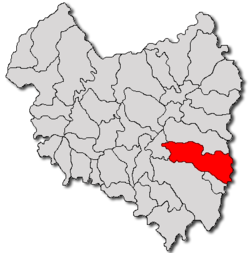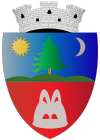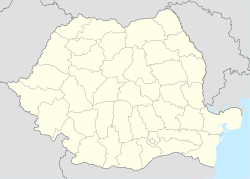Covasna
|
Covasna Kovászna |
||
|---|---|---|
| Town | ||
 |
||
|
||
 Location of Covasna |
||
| Location of Covasna | ||
| Coordinates: 45°50′57″N 26°11′7″E / 45.84917°N 26.18528°ECoordinates: 45°50′57″N 26°11′7″E / 45.84917°N 26.18528°E | ||
| Country |
|
|
| County | Covasna County | |
| Status | Town | |
| Government | ||
| • Mayor | Gyerő József (UDMR) | |
| Area | ||
| • Total | 155.11 km2 (59.89 sq mi) | |
| Population (2004) | ||
| • Total | 11,369 | |
| Time zone | EET (UTC+2) | |
| • Summer (DST) | EEST (UTC+3) | |
| Website | www.primariacovasna.ro | |
Covasna (Romanian pronunciation: [koˈvasna], Hungarian: Kovászna, Hungarian pronunciation: [ˈkovaːsnɒ], German: Kowasna) is a town in Covasna County, Transylvania, Romania, at an altitude of 550–600 m. It is known for its natural mineral waters and mofettas.
The town administers one village, Chiuruș (Hungarian: Csomakőrös). The village has a population of 451 and has an absolute Székely Hungarian majority.
According to the 2011 census, Covasna has 10,265 inhabitants. It has a Hungarian majority: 7,549 or 66.4%. 3,672 (32.3%) Romanians also live in the town.
Demographic movement according to the censuses:
Covasna is twinned with:
The Hungarian explorer and linguist Sándor Kőrösi Csoma was born in Chiuruș/Csomakőrös in 1784. Kőrösi is widely seen as the founder of Tibetology, he was the compiler and author of the first Tibetan-English dictionary and grammar book. He died in Darjeeling, India in 1842.
...
Wikipedia


